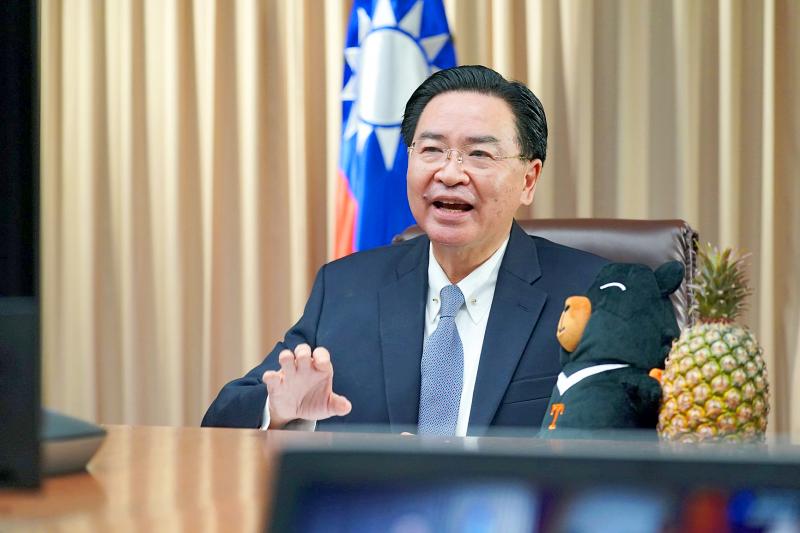Minister of Foreign Affairs Joseph Wu (吳釗燮) has been invited by the Inter-Parliamentary Alliance on China, an international cross-party group of legislators, to its meeting in Rome on Friday next week, the alliance said on Monday.
“Representatives from the Inter-Parliamentary Alliance on China (IPAC) — a body of some 200 global parliamentarians — will gather in Rome to stage a counter-meeting ahead of the G20 Leaders Summit to demand a tougher stance towards the Chinese government,” the group said in a statement.
The conference “will see parliamentarians from five continents meet with prominent leaders of groups targeted by the Chinese government, including Taiwanese Foreign Minister Joseph Wu, Sikyong of the Central Tibetan Administration Penpa Tsering, former Hong Kong legislator Nathan Law [羅冠聰] and Uyghur artist and activist Rahima Mahmut,” it said.

Photo: screengrab from the Internet
The Rome conference would be the first time that IPAC holds an in-person meeting since its launch in June last year, it said.
“Earlier this year the Chinese government imposed travel bans and other sanctions on nine IPAC members, including former UK Conservative leader Sir Iain Duncan Smith MP, Belgian Green MP Samuel Cogolati, EPP MEP Miriam Lexmann and Lithuanian Social Democratic MP Dovile Sakaliene — all of whom will be present at the Rome conference,” it said.
In Taipei, Ministry of Foreign Affairs spokeswoman Joanne Ou (歐江安) told a news briefing that the ministry is deliberating details about Wu’s visit to Europe, without confirming whether he would attend the meeting in person.
The ministry would share more information with the public once a decision is confirmed, Ou said.
IPAC is composed of the parliaments of 19 countries, spanning five continents and includes the European Parliament, she added.
It aims to promote cooperation among like-minded parliaments to push China to respect international regulations, global security and human rights through legislation, she said.
The alliance has repeatedly expressed its concern over Beijing’s verbal and military coercion of Taiwan, and its infringements on democracy, human rights and freedom, she said.
It has also voiced support for Taiwan to join the WHO and for Lithuania to develop ties with Taiwan by posting videos on Twitter, Ou said.
Aside from the meeting in Rome, Wu might attend a meeting in Prague on Wednesday and Thursday next week, according to a resolution passed by the Czech Parliament’s Committee on Foreign Affairs, Defense and Security last week.
However, the foreign ministry has yet to confirm Wu’s visit to the Czech Republic, although it has said Wu did receive an invitation from the country.
Meanwhile, a delegation of more than 65 people led by National Development Council Minister Kung Ming-hsin (龔明鑫) and Minister of Science and Technology Wu Tsung-tsong (吳政忠) is to visit Slovakia, the Czech Republic and Lithuania from today until Saturday next week.
Asked about media reports that a delegation from the European Parliament plans to visit Taiwan for discussions about disinformation next month, Ou said the ministry has no information to offer at present, but Taiwan would continue to deepen relations with the EU and its member states through various means.

DEFENDING DEMOCRACY: Taiwan shares the same values as those that fought in WWII, and nations must unite to halt the expansion of a new authoritarian bloc, Lai said The government yesterday held a commemoration ceremony for Victory in Europe (V-E) Day, joining the rest of the world for the first time to mark the anniversary of the end of World War II in Europe. Taiwan honoring V-E Day signifies “our growing connections with the international community,” President William Lai (賴清德) said at a reception in Taipei on the 80th anniversary of V-E Day. One of the major lessons of World War II is that “authoritarianism and aggression lead only to slaughter, tragedy and greater inequality,” Lai said. Even more importantly, the war also taught people that “those who cherish peace cannot

STEADFAST FRIEND: The bills encourage increased Taiwan-US engagement and address China’s distortion of UN Resolution 2758 to isolate Taiwan internationally The Presidential Office yesterday thanked the US House of Representatives for unanimously passing two Taiwan-related bills highlighting its solid support for Taiwan’s democracy and global participation, and for deepening bilateral relations. One of the bills, the Taiwan Assurance Implementation Act, requires the US Department of State to periodically review its guidelines for engagement with Taiwan, and report to the US Congress on the guidelines and plans to lift self-imposed limitations on US-Taiwan engagement. The other bill is the Taiwan International Solidarity Act, which clarifies that UN Resolution 2758 does not address the issue of the representation of Taiwan or its people in

Taiwanese Olympic badminton men’s doubles gold medalist Wang Chi-lin (王齊麟) and his new partner, Chiu Hsiang-chieh (邱相榤), clinched the men’s doubles title at the Yonex Taipei Open yesterday, becoming the second Taiwanese team to win a title in the tournament. Ranked 19th in the world, the Taiwanese duo defeated Kang Min-hyuk and Ki Dong-ju of South Korea 21-18, 21-15 in a pulsating 43-minute final to clinch their first doubles title after teaming up last year. Wang, the men’s doubles gold medalist at the 2020 and 2024 Olympics, partnered with Chiu in August last year after the retirement of his teammate Lee Yang

The Philippines yesterday criticized a “high-risk” maneuver by a Chinese vessel near the disputed Scarborough Shoal (Huangyan Island, 黃岩島) in a rare incident involving warships from the two navies. The Scarborough Shoal — a triangular chain of reefs and rocks in the contested South China Sea — has been a flash point between the countries since China seized it from the Philippines in 2012. Taiwan also claims the shoal. Monday’s encounter took place approximately 11.8 nautical miles (22km) southeast” of the Scarborough Shoal, the Philippine military said, during ongoing US-Philippine military exercises that Beijing has criticized as destabilizing. “The Chinese frigate BN 554 was